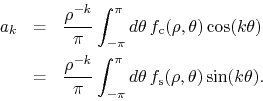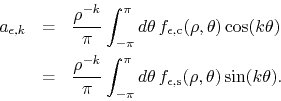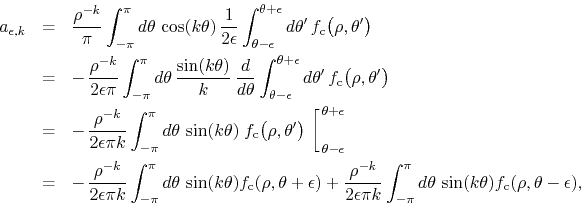Next: Alternate Proof of the Up: Appendix: Technical Proofs Previous: Appendix: Technical Proofs
Let us determine the effect of the first-order linear low-pass filter,
defined on the complex plane, on the coefficients ![]() . We start with
the Taylor coefficients of
. We start with
the Taylor coefficients of ![]() , which can be written in terms of its
real an imaginary parts,
, which can be written in terms of its
real an imaginary parts,
in terms of which the Taylor coefficients are given by

The Taylor coefficients of
![]() are similarly given by
are similarly given by

Let us work out only the first case, involving the cosine, since the work
for the second one in essentially identical and leads to the same result.
Using the definition of
![]() in terms of
in terms of
![]() we have
we have

where we integrated by parts and where there is no integrated term due to
the periodicity of the integrand in ![]() . We now change variables in
each integral, using
. We now change variables in
each integral, using
![]() , in order to obtain
, in order to obtain
![\begin{eqnarray*}
a_{\epsilon,k}
& = &
-\,
\frac{\rho^{-k}}{2\epsilon \pi k}...
...silon\right)
-
\sin\!\left(k\theta'-k\epsilon\right)
\right],
\end{eqnarray*}](img233.png)
where the integration limits did not change in the transformations of
variables due to the periodicity of the integrand. Changing ![]() back
to
back
to ![]() we are left with
we are left with

Since we recover in this way the expression of the coefficients of
![]() , we get
, we get
which is the same result obtained in the text through the application of
the filter, as an operator, to the expansion of ![]() . This more direct
derivation bypasses any preoccupations with the convergence of the series
during that process, due to the term-wise application of the integral
operator.
. This more direct
derivation bypasses any preoccupations with the convergence of the series
during that process, due to the term-wise application of the integral
operator.